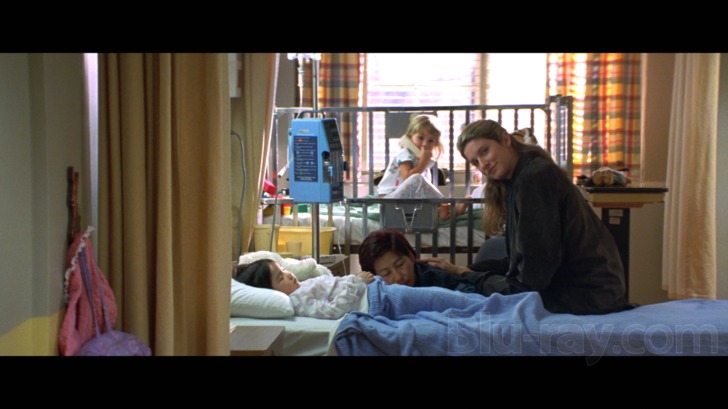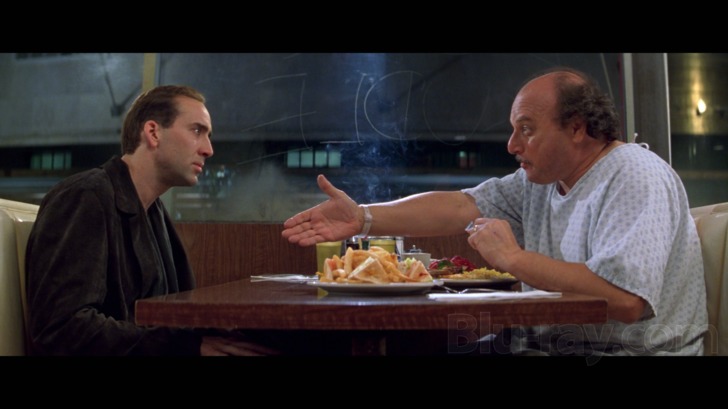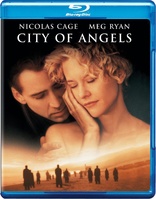City of Angels Blu-ray Movie
HomeCity of Angels Blu-ray Movie 
Warner Bros. | 1998 | 114 min | Rated PG-13 | Feb 04, 2014Movie rating
6.3 | / 10 |
Blu-ray rating
| Users | 4.0 | |
| Reviewer | 3.5 | |
| Overall | 3.6 |
Overview
City of Angels (1998)
Seth, an angel watching over Los Angeles, begins finding his job difficult as he falls in love with Maggie, a beautiful heart surgeon. She becomes interested in Seth, and soon his not-quite-mortal state seems a barrier rather than a gift. A choice must be made between celestial duty and earthly love.
Starring: Nicolas Cage, Meg Ryan, Andre Braugher, Dennis Franz, Colm FeoreDirector: Brad Silberling
| Romance | 100% |
| Supernatural | 6% |
| Drama | Insignificant |
Specifications
Video
Video codec: MPEG-4 AVC
Video resolution: 1080p
Aspect ratio: 2.40:1
Original aspect ratio: 2.39:1
Audio
English: DTS-HD Master Audio 5.1 (48kHz, 16-bit)
French: Dolby Digital 5.1 (448 kbps)
German: Dolby Digital 5.1 (448 kbps)
Italian: Dolby Digital 5.1 (448 kbps)
Spanish: Dolby Digital 5.1 (448 kbps)
Spanish: Dolby Digital 2.0
Portuguese: Dolby Digital 2.0
Czech: Dolby Digital 2.0
Russian: Dolby Digital 2.0
Polish: Dolby Digital 2.0
Japanese: Dolby Digital 2.0
Spanish 5.1 dubbed in Spain 2.0 in America
Subtitles
English SDH, French, German SDH, Italian SDH, Japanese, Portuguese, Spanish, Czech, Mandarin (Simplified), Polish, Romanian, Russian
Discs
50GB Blu-ray Disc
Single disc (1 BD)
Playback
Region free
Review
Rating summary
| Movie | 3.0 | |
| Video | 3.5 | |
| Audio | 4.0 | |
| Extras | 4.0 | |
| Overall | 3.5 |
City of Angels Blu-ray Movie Review
Love Celestially
Reviewed by Michael Reuben February 8, 2014In Face/Off, Nicolas Cage's arch-terrorist refers to Los Angeles as "Hell-A", and the name fits with the customary screen characterizations of America's pop culture capital. A graveyard of broken dreams, a morass of ego and self-deception, a hotbed of crime and corruption, or just a popular hunting ground for criminals and con artists, Los Angeles has had its cinematic image defined by such films as Sunset Boulevard, Chinatown, The Day of the Locust, L.A. Confidential, Short Cuts, Heat and the underrated To Live and Die in L.A. What a novelty, then, when a filmmaker views the city from a wholly different perspective, taking its name literally and imagining an entire population of angels that walk unseen among L.A.'s citizens, benevolently observing their activities, silently comforting their suffering and easing the transition of the dying into the afterlife. Loosely adapted from Wim Wenders' Wings of Desire (1987), City of Angels was a passion project of Dawn Steele, the glass ceiling buster who became one of the first female studio heads, first as production chief at Paramount and then as president of Columbia Pictures. In a tragic turn of events, Steele did not live to see the completed film, dying of a brain tumor in 1997 at the age of 51. Her husband, Charles Roven, had already assumed the primary role as producer on the film, which is dedicated to her memory. Director Brad Silberling had only completed one previous feature, the 1995 big screen adaptation of Casper, a kids' frivolity from Steven Spielberg's Amblin Entertainment. But as Silberling notes in his commentary, the experience taught him about effects work, and his lengthy résumé directing television, much of it for Steven Bochco, had given him a solid grounding in adult drama. Both Steele and screenwriter Dana Stevens (Safe Haven) instantly sensed that Silberling was on their wavelength. Their faith was vindicated by City of Angels' performance both domestically and abroad, where a combination of arresting visuals, Gabriel Yared's memorable score and the star power of Meg Ryan and Nicolas Cage (both at the peak of their drawing capacity) drove the box office to almost $200 million. Whether City of Angels has held up sixteen years later is a closer question.

City of Angels has two distinct narrative strands that are meant to intertwine and reinforce each other. The extent to which Stevens' script and Silberling's direction succeed in uniting these two threads will depend on the viewer. I acknowledge at the outset that I did not feel the union was successful when I first saw the film theatrically in 1998, and my evaluation has only been reinforced by subsequent viewing. The film's many fans, however, see it differently. The film's most striking visuals are those that reveal the unseen world of the celestial corps in long flowing coats that inhabit Los Angeles like compassionate caretakers. Aided by John Seale's gliding camera and Lynzee Klingman's inventive editing, we see them perched on rooftops, over freeways, on beds in hospital rooms, gathering at the shore to watch the sun rise and set, hovering in the public library that serves as their earthly home—everywhere and nowhere. An especially sensitive angel is Seth (Cage), who likes to ask each soul he escorts to the hereafter what they most enjoyed about life on earth. He notes their answers in a diary and shares them with his friend, Cassiel (Andre Braugher), whose bemused detachment is more typical of the angelic demeanor. Cassiel's capacity for acceptance seems to be boundless, whether of human frailty or God's plan, whereas Seth is a questioner. The film's second narrative element begins when Seth encounters a fellow questioner in Dr. Maggie Rice (Ryan), a driven heart surgeon who suffers a spiritual crisis when she loses a patient on the operating table. Seth is there to collect the man's soul, and Maggie catches a glimpse of him (or so it seems). As Seth stares back at the doctor, a connection occurs. The love affair that gradually develops between Maggie and Seth has all the improbabilities that one might find in a Nicholas Sparks-style romance, the kind that routinely cause critics to pan films like Message in a Bottle, The Time Traveler's Wife or Safe Haven. But these films usually do well with audiences simply because, when they're well-scripted and properly cast, viewers don't care about the details; they just want to see the lovers get together (and, depending on the story, cry when they're forced apart). In the case of City of Angels, the obstacles are somewhat steeper than usual, because, in addition to Maggie's current boyfriend, Dr. Jordan Ferris (Colm Feore), there's the substantial complication that the would-be lovers occupy different planes of existence. Fortunately for Maggie and Seth, they stumble upon a translator between their two worlds in the person of one of Maggie's patients, Nathaniel Messinger (Dennis Franz, in a rare screen appearance after he became the star of NYPD Blue). Messinger's unique insight into Seth's realm was revealed in the film's trailer, but the source of his knowledge is not explained until later in the film. It has to do with metaphysical encounters in his prior life. Anyone familiar with Wings of Desire will recognize the character as a variation of the role in which Wim Wenders cast Peter Falk. With Messinger as their guide, Maggie and Seth learn enough to make the kind of choices that could bring them together—maybe. City of Angels has aspirations to provoke the viewer's admiration for the mess, finitude and frustration of earthly life, because all our greatest joy arises from embracing those limitations. The angels do not experience touch, cannot indulge in sensual pleasure and, except for the occasional anomaly like Seth, are untroubled by emotion. (They're like super-Vulcans.) But everything that makes human existence worthwhile depends on those elements, even if the downside is aging, loss and death. The point of placing the angelic realm and the human world side by side should be to emphasize those contrasts, but as City of Angels progresses, the human love story so comes to dominate the film that it begins to feel like a standard-issue tearjerker. Now, such films can be (and frequently are) very successful. They can even be good. But given the promise of City of Angels' soaring opening sequences, one expects more.
City of Angels Blu-ray Movie, Video Quality 

Oscar-winning cinematographer John Seale (The English Patient) gave City of Angels a rich, somewhat ghostly look that makes even the non-angelic scenes appear to be set in a world apart from the intense scramble that is modern L.A. Even a scene of motorists stuck in traffic on the freeway looks less harried than such scenes appear in real life. Warner's 1080p, AVC-encoded Blu-ray captures the silken, densely textured look of Seale's photography, although the image is somewhat less sharp than one might expect from a movie shot on film from this era. The softness may be inherent to the original photography, however, due to the lighting and processing strategies described in Seale's and Silberling's commentaries. Certainly in closeups and medium shots, the detail of objects, wardrobe, hair and skin textures is more than satisfactory. It's only in long shots that faces and objects begin to soften—a necessary by-product, perhaps, of the effects shots where interchangeable angels are placed in unlikely spots in the frame or gathered together in large groups. Alternatively, this may be a byproduct of Seale's speedy approach to lighting, a frequent necessity given the logistical demands of the production's chosen locations. Blacks are generally quite good, which is important in both night scenes and for distinguishing the angels' uniformly dark outfits, which were specifically chosen to be grey rather than black (and leather rather than wool, so that light would reflect from it). A muted, cool and somber palette dominates Maggie's world, which contrasts sharply with the bursts of bright color that the hedonistic Messinger evokes or that begin to pop up around Maggie once she becomes involved with Seth. The average bitrate of 25.82 Mbps is at the high end of Warner's usual range, and the film needs all of it for its many complicated pans, edits and crowded cityscapes.
City of Angels Blu-ray Movie, Audio Quality 

The juxtaposition of City of Angels's two worlds provided interesting possibilities for the film's sound designers, and their work is fully showcased on the Blu-ray's lossless DTS-HD MA 5.1 track. The film's unseen angelic population gather at the seashore at day's beginning and end, because they hear a special kind of celestial music in the rising and setting of the sun. The peculiar tonalities of those sounds contrast sharply with the classic rock that Maggie likes to play during surgery to keep her energy at peak levels. A chorus of human thoughts echo through the soundfield, because the angels read people's minds; those thoughts seem detached from any source, as opposed to the dialogue, which remains firmly anchored to the center. Seth's "transition" late in the film (I'm being purposely vague) is a striking cacophony of voices and memories from all sides. The single most notable sound in City of Angels is the yearning score by Gabriel Yared (another Oscar winner for The English Patient). Yared's score arguably became more popular than the film itself, and the Blu-ray's omission of the isolated music track that appeared on the DVD has already prompted the cancellation of pre-orders. The score's contribution to the film's twin tales, otherworldly and romantic, is immeasurable.
City of Angels Blu-ray Movie, Special Features and Extras 

The extras have been ported over from Warner's 2004 DVD of City of Angels, but a few have been omitted. The production notes and bonus trailers won't be missed by most, and the omitted interviews with Peter Gabriel and Alanis Morissette were relatively brief. However, the DVD also had a separate music track with commentary by composer Gabriel Yared, which complemented the "scene-specific" commentaries by cinematographer John Seale and production designer Lilly Kilvert. There is no indication why Yared's track was not also included.
- Commentaries
- With Director Brad Silberling: Silberling concentrates on the technical challenges of staging and photographing various scenes and also discusses the film's casting choices and the approaches taken by various actors to their roles. Cage, in particular, probed as deeply as possible into the nature of angel existence, which is no doubt why his performance is so thoroughly imbued with an otherworldly quality. There is little doubt, by the end of Silberling's commentary, that he is satisfied with the film he made.
- With Screenwriter Dana Stevens and Producer Charles Roven: The most informative portions of this joint commentary deal with the lengthy development of the script and the long lead-up to production, during which various directors and stars came and went. Stevens and Roven also discuss their communications with German director Wim Wenders throughout the process, including his favorable reaction to Stevens' script.
- Scene-Specific Commentary with Director of Photography John Seale (17:36): Seale covers everything from the reasons for choosing anamorphic widescreen to the specific film stock he used. As technical commentaries go, this one is an invaluable source.
- Scene-Specific Commentary with Production Designer Lilly Kilvert (17:36): It is clear from her comments that Kilvert works intuitively. The best parts are when she talks about the film's themes with what is obviously a deep personal enthusiasm.
- Making Angels (480i; 1.33:1; 29:30): This entertaining behind-the-scenes featurette contains interviews with Silberling, Roven, Seale, Kilvert, Cage and Ryan, and it also provides substantial on-set footage from various portions of the shoot. The longest section involves the vertiginous set built fifty-seven stories above L.A., where Cage and Dennis Franz play a key scene without the benefit of green screen. Both actors refused to mount the rig until Roven and Silberling had sat in it themselves.
- The Making of the Visual Effects for City of Angels (480i; 1.33:1; 10:28): John Nelson of Sony Pictures Imageworks provides a tour of the film's main visual effects.
- Additional Scenes w/Optional Commentary by Brad Silberling and Editor Lynzee Klingman) (480i; 2.40:1; 12:39). The scenes are not separately listed, but each one is introduced by an intertitle. They are reproduced below.
- Seth Studies Maggie
- Maggie's Nighttime Bedroom
- Maggie's First Surgery (extended cut)
- Maggie Makes Dinner
- Maggie & Seth Visit Messenger
- Maggie Looks for Angels
- Killing Your Babies . . . : A montage of beautiful images that couldn't fit into the film.
- Music Videos
- U2 "If God Will Send His Angels" (480i; 1.33:1; 4:46)
- Goo Goo Dolls "Iris" (480i; 1.33:1; 3:50)
- Theatrical Trailer (480i; 1.78:1, enhanced; 2:04): A rare example of truth-in-advertising, the trailer stresses the film's romantic element.
City of Angels Blu-ray Movie, Overall Score and Recommendation 

City of Angels is a sincere effort and an unusual film. Whether it will win you over, as it has so many, or leave you feeling that it falls short, which remains my reaction, it is not an experience you are likely to forget. Warner's Blu-ray is a superior presentation and, despite having fewer features than the DVD, still boasts more features than most Blu-rays currently being released. On that basis, the disc is recommended.
Similar titles
Similar titles you might also like

All the Real Girls
2003

Moonlight Mile
2002

Spread
2009

Meet Joe Black
1998

The Lake House
2006

A Tale of Two Cities
Warner Archive Collection
1935

Closer
2004

P.S. I Love You
2007

Magnificent Obsession
1954

Ask the Dust
2006

My Blueberry Nights
2007

Romeo + Juliet
William Shakespeare's Romeo + Juliet
1996

Fedora
1978

Sweet November
2001

An Officer and a Gentleman
1982

Disobedience
2017

Restless
2011

Ondine
2009

Eat Pray Love
2010

What Dreams May Come
1998
